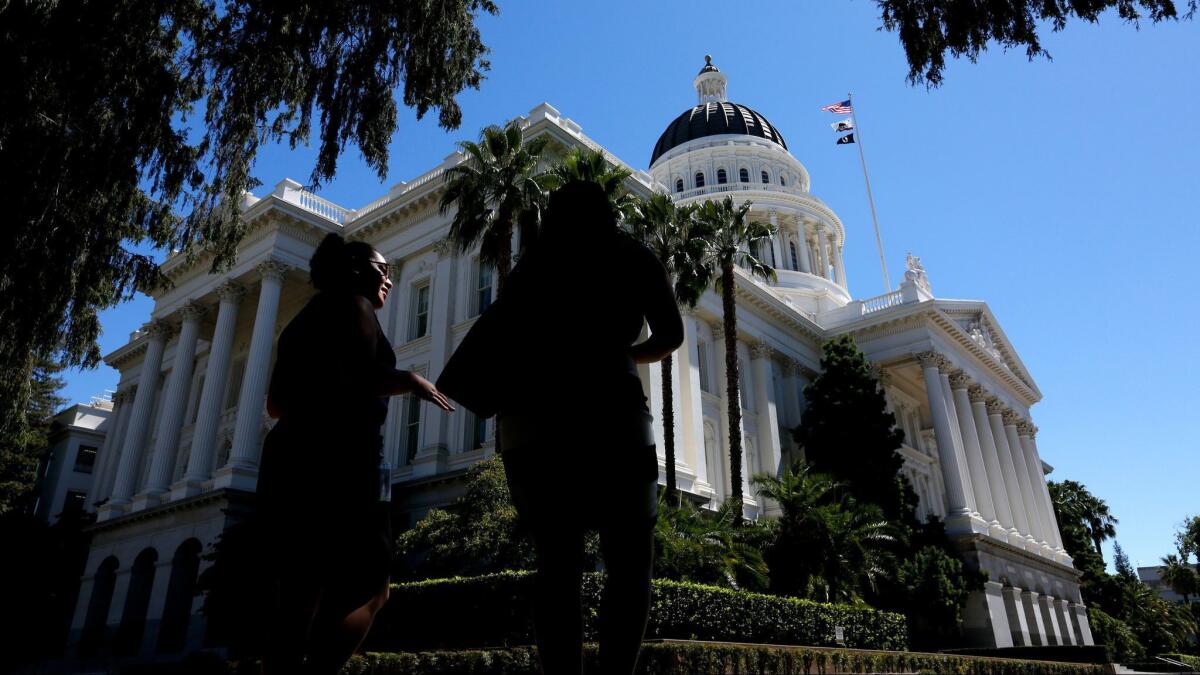Op-Ed: California needs a public ombudsman

- Share via
For 50 years, California law has required government agencies to make most records available to the public upon request, in keeping with the notion that the state must be accountable.
As the California Supreme Court ruled in 1986, “In order to verify accountability, individuals must have access to government files. Such access permits checks against the arbitrary exercise of official power and secrecy in the political process.”
Unfortunately, officials intent on escaping accountability are often in a position to unlawfully deny public records requests. Among those who do so systemically is the Los Angeles Police Department, according to a lawsuit filed by the American Civil Liberties Union. Indeed, filing lawsuits is often the public’s only recourse — and an arduous path that sometimes ends in greater transparency but is beyond the means of many.
Officials intent on escaping accountability are often in a position to unlawfully deny public records requests.
That longstanding problem has been exacerbated, in recent years, by the waning fortunes of local newspapers, many of which have fewer resources available to prosecute their watchdog role with public records lawsuits.
A newly proposed remedy could not be more timely.
Assemblyman Vince Fong (R-Bakersfield) is sponsoring Assembly Bill 289, which would create an ombudsman position in the Bureau of State Audits. This ombudsman would hear appeals from anyone who believes that his or her California Public Records Request was unlawfully denied.
Fong is a Bakersfield native and UCLA graduate. He represents most of Kern County. Last year, I met several of his constituents, each in a different profession, who sought out their representative’s help when opaque state bureaucracies threatened their ability to earn a living. I was struck by the fact that it was often difficult even for a sitting legislator to get pertinent information about what was going on inside those state agencies.
“The scale is skewed toward the state bureaucracy,” Fong told me last week. “The people left out are the public. There has to be some form of fairness. Let’s revamp the process so there’s a referee.” Under his proposal, the referee would work in the office of the already existing California State Auditor, “which is independent of the executive branch and legislative control.”
The general approach would not be unique. Some other states have public records ombudsmen, as does the federal government.
“They can be effective in helping the public obtain records, or even a response, from government agencies,” Rick Blum, policy director at the Reporters Committee for Freedom of the Press, told me recently.
New York’s office may issue nonbinding advisory opinions. In Pennsylvania, an ombudsman has the authority to issue binding opinions in disputes between requesters and agencies, Blum explained, and “in the District of Columbia, the person did such a great job the agencies pushed back and the office was gutted.” Oregon appointed its first public records advocate last year.
John Wonderlich, who leads the Sunlight Foundation, a nonprofit that advocates for open government, told me that while he wouldn’t want an ombudsman to foreclose the possibility of challenging public records denials in court, in practice, a position like the one Fong hopes to create almost always strengthens the rights of requesters.
“Most people can’t credibly threaten litigation,” he explained. “Having a public advocate means that every request has to be taken a little bit more seriously.”
That’s why even a lightly staffed ombudsman’s office might be able to have an outsize influence on the public’s ability to get information when legally entitled to have it. But since the details are still being sorted out, I’d urge a more ambitious approach.
Enter the Fray: First takes on the news of the minute »
An ombudsman with enough staff to answer all appeals in a timely manner might be funded in part through fines levied on state agencies when they are ruled to have wrongly denied a request.
At the very least, the ombudsman should have the power to compel disclosures, not merely to advise that the law has been violated. The more teeth the law has, the more likely bureaucrats are to comply with lawful requests, effectively reducing the office’s workload.
The ensuing increase in transparency is likely to be well worth any initial hit to the state budget, as over time watchdogs will be better able to spot corruption and inefficiencies. Democratic legislators and Gov. Gavin Newsom should lend this good government effort their support.
Conor Friedersdorf is a contributing writer to Opinion, a staff writer at the Atlantic and founding editor of the Best of Journalism, a newsletter that curates exceptional nonfiction.
Follow the Opinion section on Twitter @latimesopinion or Facebook
More to Read
A cure for the common opinion
Get thought-provoking perspectives with our weekly newsletter.
You may occasionally receive promotional content from the Los Angeles Times.









